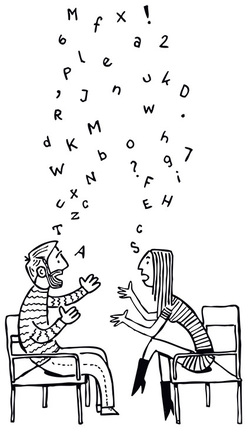
Workshops in dialogue form are actually simplified group discussions with the aim of allowing the participants to examine an issue thoroughly, challenge each other’s views and develop their viewpoints/arguments to reach a deeper understanding of and insight into the issue/subject.
The workshops enable in-depth discussion on a specific topic with a couple of people for a few hours. They are also useful when an organisation wants better insight and understanding of what could lie behind people’s views or a statement. The workshop in dialogue form is similar to the focus group, but tends to focus more on dialogue, discussion and negotiation. A workshop may take anywhere from a few to several hours to complete. It is a small-scale event. Workshops in dialogue form include only a limited number of people and can consequently not be used to collect statistically significant information for measuring the general opinion accurately. The fact that the participants’ views are developed through discussions could also mean that they are not representative of the remaining citizen collective. The method could provide the organisation with valuable information on citizen views and standpoints on a certain issue, however. The participants have the time and opportunity to discuss an issue thoroughly, including expenses, advantages and long-term consequences. Through discussions with others, the participants acquire insights into other perspectives, allowing their own views to develop and be challenged. The dialogues may build and strengthen relations between participants, and could provide them with new knowledge and skills. Usually, 8 to 16 participants meet; who they are depends on what the issue is. Participants may be selected from demographics, interest groups, or at random. The costs for this form are generally not very high, unless you have to find participants through a genuinely random selection which could involve expenditure. Citizens may need carrots to make them take part in the workshop. Additional costs may include rent for meeting premises (choose informal surroundings if possible), catering and supportive arrangements, like childcare. (SALAR)
The workshops enable in-depth discussion on a specific topic with a couple of people for a few hours. They are also useful when an organisation wants better insight and understanding of what could lie behind people’s views or a statement. The workshop in dialogue form is similar to the focus group, but tends to focus more on dialogue, discussion and negotiation. A workshop may take anywhere from a few to several hours to complete. It is a small-scale event. Workshops in dialogue form include only a limited number of people and can consequently not be used to collect statistically significant information for measuring the general opinion accurately. The fact that the participants’ views are developed through discussions could also mean that they are not representative of the remaining citizen collective. The method could provide the organisation with valuable information on citizen views and standpoints on a certain issue, however. The participants have the time and opportunity to discuss an issue thoroughly, including expenses, advantages and long-term consequences. Through discussions with others, the participants acquire insights into other perspectives, allowing their own views to develop and be challenged. The dialogues may build and strengthen relations between participants, and could provide them with new knowledge and skills. Usually, 8 to 16 participants meet; who they are depends on what the issue is. Participants may be selected from demographics, interest groups, or at random. The costs for this form are generally not very high, unless you have to find participants through a genuinely random selection which could involve expenditure. Citizens may need carrots to make them take part in the workshop. Additional costs may include rent for meeting premises (choose informal surroundings if possible), catering and supportive arrangements, like childcare. (SALAR)
 RSS Feed
RSS Feed
